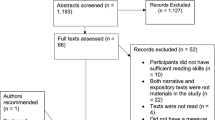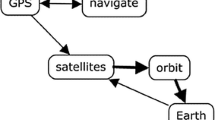Abstract
This study investigates how, and to what extent, young readers (7–8 year-olds) use text information or their prior knowledge when answering comprehension questions about narrative texts. The children were asked to explain how they found out their responses by answering the following question: “how do you know this answer?” Their answers and justifications were analysed both qualitatively and quantitatively. The text proved to be the main source of information for these readers. However, sometimes the children seemed to ignore the text and over rely on their prior knowledge to answer the questions. The procedure of asking children to justify their answers was shown to be a good way of specifying more precisely some of their problems in text comprehension. It also seemed to encourage them to look back at the text and review their responses and, as such, it could be considered a useful tool to improve children’s reading comprehension.
Similar content being viewed by others
References
B.C. Adams L.C. Bell C.A. Perfetti (1995) ArticleTitleA trade relationship between reading skill and domain knowledge in children’s text comprehension Discourse Processes 20 307–323
P.A. Alexander D.L. Schallert V.C. Hare (1991) ArticleTitleComing to terms: How researchers in learning and literacy talk about knowledge Review of Educational Research 61 315–343
F. Armand (2001) ArticleTitleLearning from expository texts: Effects of the interaction of prior knowledge and test structure on responses to different question types European Journal of Psychology of Education 16 67–86 Occurrence Handle10.1007/BF03172995
Brandão, A.C.P. (1994). Produçã o e compreensã o de histó rias em crianç as (Production and comprehension of stories by children). Unpublished master’s thesis. Universidade Federal de Pernambuco, Brazil
K. Cain J.V. Oakhill (1999) ArticleTitleInference making ability and its relation to comprehension failure in young children Reading and Writing: An Interdisciplinary Journal 11 489–503 Occurrence Handle10.1023/A:1008084120205
K. Cain J.V. Oakhill M.A. Barnes P.E Bryant (2001) ArticleTitleComprehension skill, inference␣making ability and their relation to knowledge Memory Cognition 29 850–859
F.W. Danner (1976) ArticleTitleChildren’s understanding of intersentence organization in the recall of short descriptive passages Journal of Educational Psychology 68 174–183
F.J.R.C. Dochy P.A. Alexander (1995) ArticleTitleMapping prior knowledge: A framework for␣discussion among researchers European Journal of Psychology of Education 10 325–242
R. Garner R. Reis (1981) ArticleTitleMonitoring and resolving obstacles: An investigation of spontaneous text lookbacks among upper-grade good and poor comprehenders Reading Research Quarterly 16 569–582
R. Garner V.C. Hare P. Alexander G. Haynes P. Winograd (1984) ArticleTitleIntroducing use of a text lookback strategy among unsuccessful readers American Educational Research Journal 21 789–798
W. Kintsch (1988) ArticleTitleThe role of knowledge in discourse comprehension: A construction-integration model Psychological Review 95 163–182 Occurrence Handle10.1037/0033-295X.95.2.163
W. Kintsch (1998) Comprehension: A paradigm for cognition. Cambridge University Press Cambridge
M.V. Lipson (1982) ArticleTitleLearning new information from text: The role of prior knowledge and reading ability Journal of Reading Behavior 14 243–262
M.B. Marr K. Gormley (1982) ArticleTitleChildren’s recall of familiar and unfamiliar text Reading Research Quarterly 18 89–104
S. McCormick (1992) ArticleTitleDisabled readers’ erroneous responses to inferential comprehension questions: Description and analysis Reading Research Quarterly 27 55–77
D.S. McNamara W. Kintsch (1996) ArticleTitleLearning from texts: Effects of prior knowledge and text coherence Discourse Processes 23 247–288
M.D. Neale (1989) The Neale analysis of reading ability – Revised. NFER-Nelson Windsor, England
T. Nicholson R. Imlach (1981) ArticleTitleWhere do their answers come from? A study of inferences which children make when answering questions about narratives stories Journal of Reading Behavior 13 111–129
P.D. Pearson J. Hansen C. Gordon (1979) ArticleTitleThe effect to background knowledge on young children’s comprehension of explicit and implicit information Journal of Reading Behavior 11 201–209
M. Pressley (2000) What should comprehension instruction be the instruction of? M.L. Kamil P.B. Mosenthal P.D. Pearson R. Barr (Eds) Handbook of Reading Research EditionNumber3 Lawrence Erlbaum Associates Mahwah, NJ 545–562
M. Pressley P. Afflerbach (1995) Verbal protocols of reading Lawrence Erlbaum Associates Hillsdale, NJ
T.E. Raphael J. McKinney (1983) ArticleTitleAn examination of fifth and eighth-grade children’s question-answering behaviour: An instructional study in metacognition Journal of Reading Behavior 15 67–86
T.E. Raphael P.D. Pearson (1985) ArticleTitleIncreasing students’ awareness of sources of information for answering comprehension questions American Educational Research Journal 22 217–235
T.E. Raphael C.A. Wonnacott (1985) ArticleTitleHeightening fourth-grade students’ sensitivity to sources of information for answering comprehension questions Reading Research Quarterly 20 282–296
D.R. Recht L. Leslie (1988) ArticleTitleEffect of prior knowledge on good and poor readers memory of text Journal of Educational Psychology 80 16–20 Occurrence Handle10.1037/0022-0663.80.1.16
M.L. Taft L. Leslie (1985) ArticleTitleThe effects of prior knowledge and oral reading accuracy on miscues and comprehension Journal of Reading Behavior 17 163–179
B.M. Taylor (1979) ArticleTitleGood and poor readers’ recall of familiar an unfamiliar text Journal of Reading Behavior 11 375–380
T.A. Dijk Particlevan W. Kintsch (1983) Strategies for discourse comprehension. Academic Press New York
J.F. Voss G.T. Vesonder G.J. Spilich (1980) ArticleTitleText generation and recall by high-knowledge and low-knowledge individuals Journal of Verbal Learning and Verbal Behavior 19 651–667 Occurrence Handle10.1016/S0022-5371(80)90343-6
M.M. Wilson (1979) ArticleTitleThe processing strategies of average and below average readers answering factual and inferential questions Journal of Reading Behavior 11 235–245
Author information
Authors and Affiliations
Corresponding author
Rights and permissions
About this article
Cite this article
Brandão, A.C.P., Oakhill, J. “How do You Know this Answer?” – Children’s Use of Text Data and General Knowledge in Story Comprehension. Read Writ 18, 687–713 (2005). https://doi.org/10.1007/s11145-005-5600-x
Issue Date:
DOI: https://doi.org/10.1007/s11145-005-5600-x




